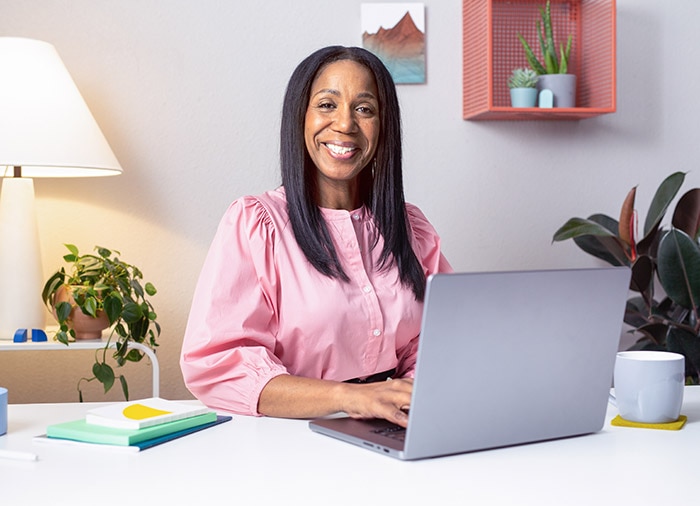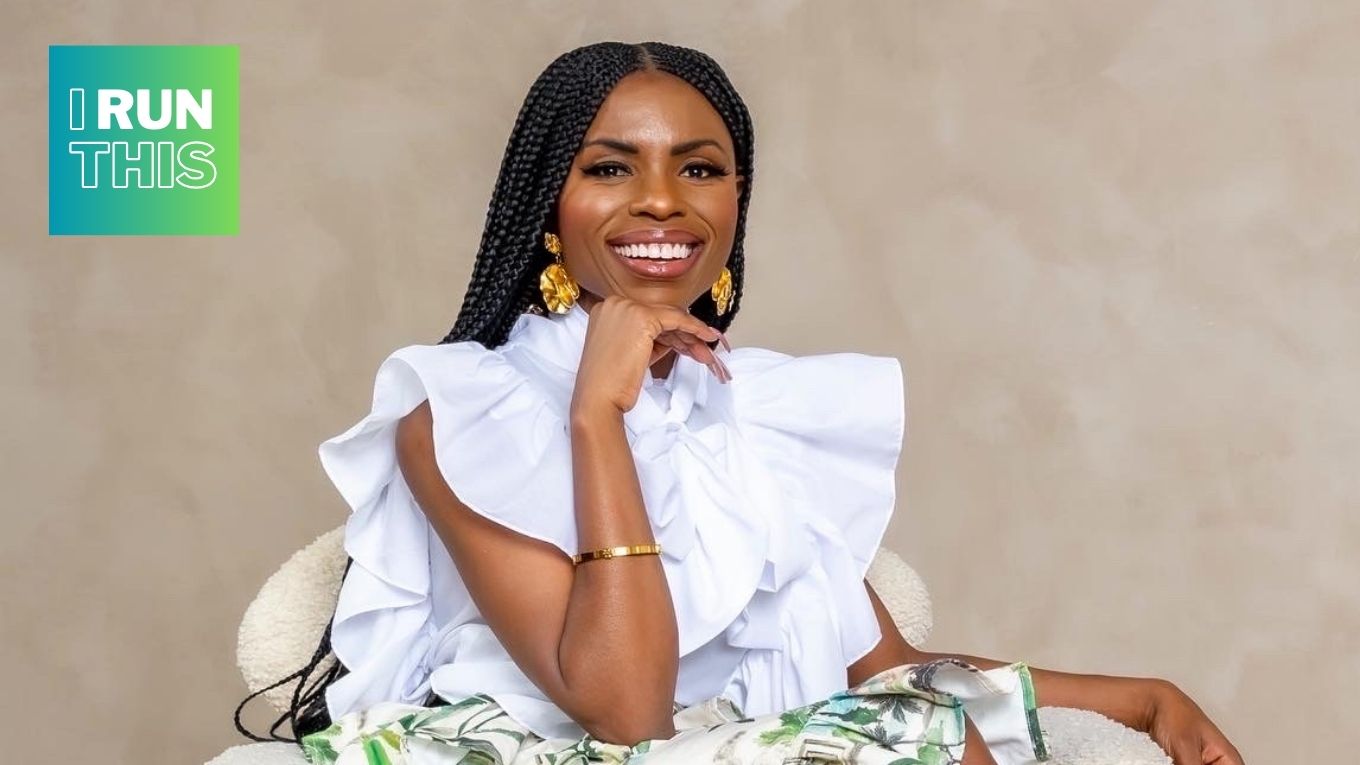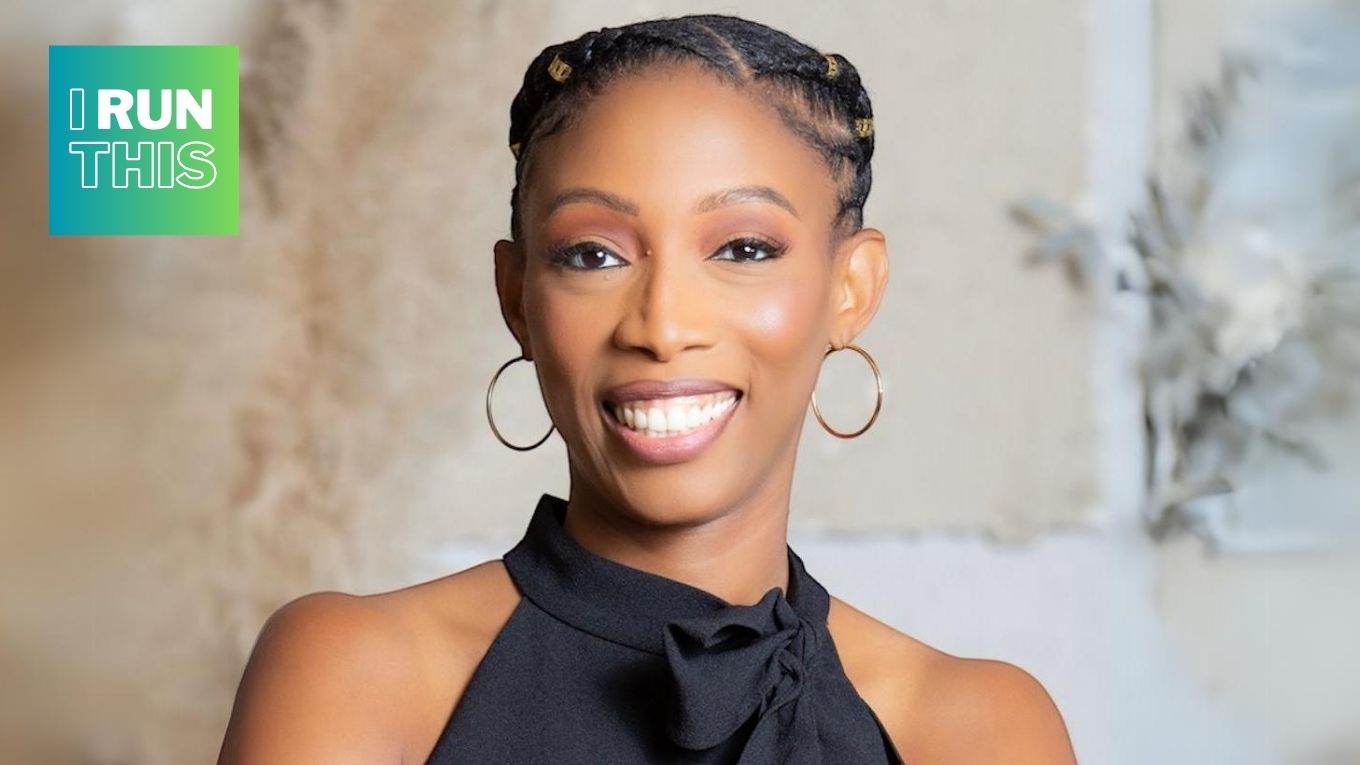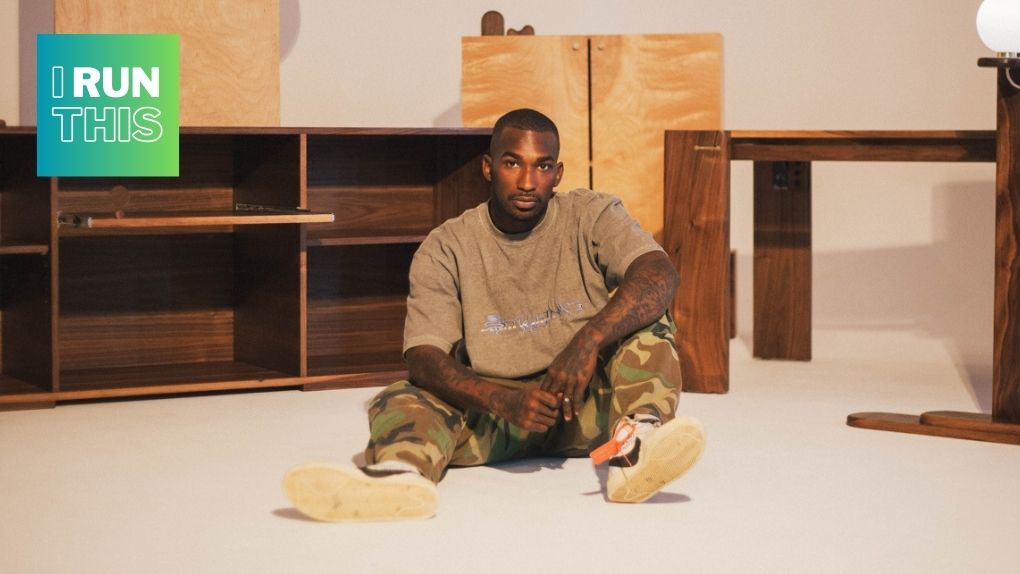Owning a small business can be one of the most rewarding and challenging things a person does. Amid an uncertain economy and ever-evolving consumer trends, there is a lot to figure out and navigate to ensure your business thrives. Join hosts Jannese Torres (Yo Quiero Dinero) and Austin Hankwitz (Rate of Return) as they connect with small business owners and hear their stories about managing the ups and downs of starting and growing a small business. Listen and learn valuable lessons from their experiences that will guide you along the way through your own small business journey.
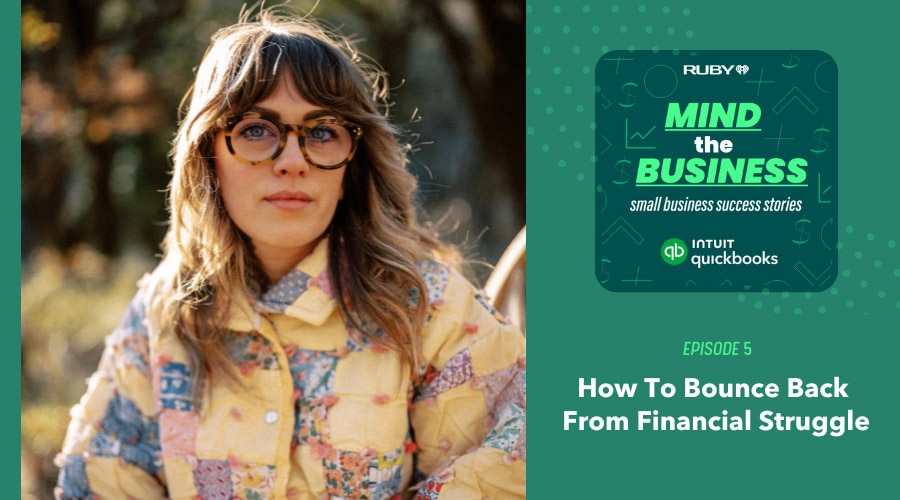
How to bounce back from financial struggle
Taylor Randal grew up on a farm in Washington state where she learned to make things by hand and be self-reliant. Her earliest memories are of sitting on her grandmother's floor, measuring yarns and hand-tying quilts. Eventually, her grandmother gifted her a prized vintage Montgomery Ward sewing machine, and Taylor would go on to create quilts as a side job.
When a financial emergency forced her to get creative, she did just that — crafting vintage garments to sell on Depop. After more orders started coming in, she moved her business to Instagram and found herself featured in the New York Times a month later. Taylor is no stranger to the challenges of starting her own business, and faced near ruinous adversity while trying to navigate the unique and complicated taxes that come with self employment. She is very vocal about overcoming her own hurdles and helping others overcome theirs. Today, she runs her own business called Softpaw Vintage, where she creates clothing and accessories from vintage textiles.
Taylor Randal: Thank you for having me. I'm tickled pink.
Austin Hankwitz: This is going to be such a fun conversation. Now, before we jump into the navigating taxes part of the conversation, I want to learn a little bit more about your business, starting with the name. Is there a story behind the name Softpaw Vintage?
Taylor: I mean, kind of. I have two dogs and I had two cats at the time and they would walk all over the fabric and it kind of came through that. I wanted something short and sweet that people could digest easily, and Softpaw kind of just stuck.
AH: It's such a cool name. Now let's jump into the nitty gritty a little bit. I'm curious, how much of your childhood was spent learning to sew and create? Did you get to appreciate it right away?
Taylor: I think so, yeah. It's a generational thing for sure, and I've always been drawn to crocheting, knitting, and hand-sewing. And my grandma would make the quilts, and then like, fashion them all together. So I remember quilts being laid out in the living room and helping her do the yarn ties. So I feel like it's just been part of my childhood and how I grew up.
AH: Absolutely. We talked about you selling your first coat on Depop. What went through your mind when you were like, “Wait a second, I am on Depop. It just sold. I'm making money.” How cool was that for you?
Taylor: Well, it was out of necessity because — it’s the common COVID story — I actually was bartending prior and selling vintage was just a side hustle. And when everything shut down, luckily I had a decent amount of inventory. So I had distressed vintage denim and a stack of quilts that I just collected because I liked them. And I had made a coat for myself prior and a lot of people…when I'd wear it out, I got a lot of compliments on it. And so I kind of was just being resourceful. So I made that first jacket, and when it sold, it definitely was really encouraging and rewarding. And then I started getting this influx of like messages for custom orders, and I kind of just dove all in. I mean, I thought I would bartend the rest of my life. It was good money, and I was really good at it, and I would be able to afford my hobbies and crafts on the side.
And so when it just jumped off like that, something did kind of click where I was like, “Oh, maybe this is what I'm meant to be doing.” And there was that imposter syndrome of like…I knew how to sew but not garment construction. I wasn't familiar with the ins and outs of technical sewing. So as it kind of snowballed, I had to catch up to the demand of what people were expecting. I think it was the fire that I needed under me.
Jannese Torres: I love it. And it's just such a common narrative that we hear from so many entrepreneurs. This happens by accident. It's one of those things where you don't even realize you're starting a business. And so with that comes real life business problems, right? The thing about a lot of business owners is they tend to share their victory stories on social media. But you're very open about the challenges that you face and how you've overcome them, which is great because I feel like you're helping other people avoid those same mistakes. So when you first started selling online, what was the first hurdle that you faced?
Taylor: I would say, honestly, it was kind of like “comparison bingo” because there was this influx of other people in a similar vein to what I was doing. I want to support the community and be a part of it by uplifting other artists and makers. But for me, I was getting in my own head and I think when I kind of released that and just stayed in my own lane and wasn't looking to do what others were doing, I think that really shifted my creativity and it expanded my mind.
And I think that having a good, healthy boundary with social media is important for me. I mean, I make money through promoting and marketing through Instagram. And I'm very thankful for the following that I have, but it feels like a double-edged sword because I feel like at times I'm considered like a content creator. People like to see how I live just as much as they like to support my art, which is like a conflicting feeling. You know what I mean? Like it's kind of a weird feeling.
JT: I think you can almost feel like you don't necessarily own any part of your existence when you're sharing all of it. So I think that's where that healthy boundary comes in of just being okay with not necessarily having to show your entire existence on social media and utilizing what is most effective from a content perspective to get to your business goals without kind of losing what belongs to you.
Taylor: Yeah. And that's kind of why I've navigated towards doing a newsletter for paid subscribers to kind of funnel them — like the people who want to hear it can, where I can talk about more vulnerable things versus just feeling like I'm on blast on Instagram. And like some people just want to see the stuff that I'm making, you know? And some people want to see my dogs and hear about my sobriety and how I navigate my taxes and like small business stuff. So I think funneling people into that newsletter is the best of both worlds.
JT: So you mentioned taxes. Let's talk a little bit about that. So we talk a lot about revenue, but you know, they say “mo’ money, mo’ problems,” right? So can you talk about how you've learned the hard way to navigate the taxes that come with having a business?
Taylor: I mean they don't teach you that stuff in school, you know? Like I knew taxes were real. They say death and taxes are the two things that are unavoidable in life and I think that I was just like turning my head the first couple of years. I just would go plug in the numbers from the forms that I got and then just think, “Okay, I did the thing.”
But the IRS is not forgiving. You can't be off a couple numbers. You can't just guess. So I think if I could go back in time, I would tell my younger self to just buck up and get an account and get stuff squared away to stay up on your quarterly. I just didn't know what I was doing and I'm definitely still paying for it. And it's hard to speak from the wound. Do you know what I mean? Like, I haven't really rounded the corner fully yet. I'm still sorting it out and untangling the mess that I had created.
JT: Yeah, taxes are one of the most excruciating parts of owning a small business and I've had my fair share of unexpected tax bills multiple times. So can you tell us about what your experience has been like and how you've navigated that tax bill?
Taylor: Well, how I found out about the immense tax debt that I'm in is — you know, my business was growing and I thought I was in a position to potentially buy a house. So, in doing so, when you start talking to the broker and such, they need three years of back taxes. Through that, I unearthed the fact that I had done 2020 wrong and in doing so, I got my accountant and we amended that return. And I was living in my cute, perfect dream cabin on Mt. Hood, you know, just chopping my firewood, taking my dogs on hikes and sewing all day — living my literal dream — and then I found out that instead of the $800 that I had paid the IRS, I actually owed them closer to $10,000. And that was just through the IRS because federal and state are different. I also owed Oregon State about $3,000. And so it just kind of snowballs into the point where I owe about $30,000 to the IRS.
So it was definitely overwhelming. I cried a lot and I threw my hands up and I was like, I can either keep going forward and hope that it works out or I can just give up and go back to bartending. But I've really gotten accustomed to being my own boss and making my own hours and I still enjoy sewing and I don't want to give that up. So I just took a deep breath and I started looking for an accountant. And the thing about the IRS, even though they are big, mean, scary, and inevitable, as long as you're in communication with them and actively making payments, they're not going to come and take your car. They're not going to come and take your TV or your dogs or you know what I mean?
I'm on a payment plan with them every month and it's for what I can afford. You know, I've looked at my budget and realistically, like, what can I get away with giving them without sacrificing a lot in my day-to-day life for myself personally and still maintain the business?
AH: So, what was the one thing you did that you think was really effective in getting yourself set up for success moving forward?
Taylor: I switched from an LLC to an escrow and I'm on a payroll company — so I pay myself out through the payroll company. So I don't have to deal with figuring out taxes — it's kind of programmed in there — just like if I was to go work at a restaurant and get a W-2, my taxes already get taken out, and so that kind of takes out the guessing game of just chucking money at the IRS and trying to anticipate based off of last year's sales what I should be setting aside. And my landlord was raising the rent at the cabin and it just wasn’t sustainable. I can't pay $2,000 in rent by myself and also be trying to get ahead of quarterly and material and everything else that goes into running a business and also paying off that tax debt.
So I had this opportunity to go live and work on this farm in a work trade situation. The house I lived in was unfinished, but I wasn't paying rent. And so in that nine month period, I was able to chuck $20,000 at the IRS. I was so privileged to have that opportunity. I wasn't paying electricity, I wasn't paying for anything, but it was hard labor and I learned a lot. Come January, I was ahead quarterly. Like, I was in a good spot where I could come home. I want to come back to Portland. I don't wanna look at it as punishing myself, you know? And I kind of wish I would've not been so hard on myself about it. The farm was beautiful and I learned so much and it served its purpose. But at the end of the day, I'm just so happy to be back in Portland and have the lights on past 6 p.m. and have clean running water. The whole journey has just shaped me to really appreciate every little thing. So it was necessary.
JT: I really appreciate your perspective, Taylor, because I think a lot of people who would encounter that — it might be the thing that discourages them from continuing to run their business. I think it's important to know there are options for managing unexpected tax bills. So just know you're not alone in the struggle, but there are tools out there to help you.
Taylor: Yeah, one hundred percent. And it's allowing me to pivot in different ways where I'm now actively trying to create passive income. I started making patterns where people who are like, “Oh, I love that dress. I wish I could make that.” They can go to my website and buy the pattern. I've also taught classes live on Zoom that are recorded and can be sold. And then the newsletter is $5 per month and people who want to access that part of my life can.
JT: Yeah, you're speaking my love language. Multiple income streams are the best. So, you know, the way that you share your challenges and your successes on social media is one of the best things we can do as entrepreneurs, because it helps everyone. And the thing that I love about QuickBooks, and specifically their QuickBooks Money tool, is that they're helping entrepreneurs navigate exactly what you're talking about: Keeping track of getting paid, keeping track of your taxes and all of those things. So can you talk about what strategies you're now using to keep track of your finances and your regular product output?
Taylor: I actually use the QuickBooks app and they have an umbrella for self-employment. That was one of the first steps that I did on my own. And then I hired an accountant who helps me with my profits and losses and keeps that stuff dialed for me. The stuff that I can't wrap my head around.
AH: Let's pretend we're talking to the solopreneur who's really excited about 2024 because they're going to finally start their solopreneurship journey. What piece of advice could you give that new business owner listening right now to help them avoid the challenges that you faced in your business back then?
Taylor: Get the QuickBooks app and get familiar with your profits and loss. And another thing that I think has been really helpful for me is just sticking with my gut. As my business started to gain momentum, I had a lot of opportunities to do things that didn't really resonate with me or my business. I think staying true to myself and my gut is what got me to this point and I think people appreciate that — that I'm not trying to sell them something that I don't support.
AH: What incredible advice, Taylor.
JT: Yeah, that's fantastic. Let's talk a little bit about your marketing strategy for your business. You started on Depop and then eventually moved to Instagram to sell your products. Can you tell us what that transition was like? And did you have to rebuild an audience or did customers kind of just follow you from one site to another?
Taylor: The reason I chose to go to Instagram was that Depop had so many fees. It felt like such a huge blow. I would make a jacket for $200 and they're taking $25 and then the shipping and everything else. So I started Instagram to just try throwing it at the wall to see what stuck. I was just trying to make money in any form of creativity. It wasn't specifically quilts. And during COVID, People were just at home on their phones and there was this huge quilt movement.
I think it was just the perfect storm for me, honestly. But I started utilizing my platform to also — I lived in this cabin on Mount Hood and I'd film me chopping wood or…you know people were just interested in this weird little chick who's just living in the woods with her dogs and making clothes out of quilts and chopping her own firewood. So I think it was me just being me and also making cool sh*t. People were there for it, and it grew.
JT: Well, because it feels very authentic when you see someone living a lifestyle that then feeds into the products that they're selling. Like, you live a sustainable lifestyle — that is a very important aspect of who you are. And so the fact that the products you're selling reflect that is why people resonate with it so much. Because it's real. It's not just something you're hopping on because it's trendy.
So let's talk more about that. Do you actually research what is selling and what is falling out of style? And how much do you lean on trends? Versus just taking inspiration from your own originality when you design something.
Taylor: So I think in terms of sustainability, I think the trend of the word just needs to disappear. But this full circle movement of — these quilts were made in the early 1900s from clothes and then I turned them back into clothes. I would like to think that it's a timeless movement versus a trend. So I don't really look at anything other than just putting out stuff that I think is cool and looks good and hoping that other people agree. So to answer your question, I think that even the word “trend” shouldn't be a thing in terms of fashion because that's what's killing the planet.
AH: So you've actually said when sewing magazines interview you, they often ask the same question: When did you start your business? And you share an answer that gives me goosebumps every single time I read it, which is saying it wasn't when you sold your first garment or started your LLC, but instead when you started to take yourself seriously. Talk to me about that. When did you realize that and what moment really inspired an answer like that?
Taylor: I was living with a partner and a roommate at the time and it was during COVID. My roommate ended up leaving and then me and my partner broke up and he moved out, and so I just surrendered and I was like, “If I can just get creative and pay rent and put food on the table and feed my dogs, then I will have been successful.”
Instead of being a victim to the situation and just throwing my hands up and like, “poor me,” I decided to start taking myself seriously. And I think those are really pivotal times when you kind of step up, and that's what I did. And then a month later, I was in the New York Times.
AH: Oh my gosh, I could not imagine that. And I totally agree. I think something that resonates here with me…back in the day when I first started my business I had to look myself in the mirror and say: There's not a plan B. It's either plan A, we make it work, or plan A, we make it work. So, shout out to you for making it work and making it into the New York Times. Now, I'm curious, do you have a favorite piece you enjoy creating the most?
Taylor: I think the jackets. I feel like they're timeless and I've made so many of them that maybe I'm just the most comfortable throwing one together. I could probably just cut it out without even using a pattern. I think that's my favorite. But also, when I get a piece of material, sometimes I'll just know. “Okay, this I'm making into a shirt or like this is going to be a skirt.” And that's when I feel the most fulfilled. When I'm just inspired by something.
AH: What is next for Taylor Randall?
Taylor: Podcasting. I don't know, I've just felt really called to do it. I don't really see myself as a writer, but I think that I'm good at speaking and articulating myself in more of a flow state instead of sitting down and trying to get my ideas out. So on Substack, there's actually an area where you can add podcasts. I think that would be a good place for me to dip my toe in and just do little recordings, like Q and As or whatever. But I'm going to keep sewing forever. I think I'm just going to keep sewing until my hands fall off.
AT: As you should. You are super talented and I cannot wait to tune into the podcast on your sub stack.
This podcast is a production of iHeartRadio and Intuit QuickBooks. Our executive producer is Molly Sosha, our supervising producer is Nakia Swinton, and our writer is Eric Leeja. Our head of post production is James Foster. QuickBooks Money is a stand alone Intuit offering. Banking services provided by Green Dot Bank, member FDIC. Only funds in envelopes earn annual percentage yield. APY can change at any time. Money Movement Services provided by Intuit Payments, Inc., licensed as a money transmitter by the New York State Department of Financial Services.








